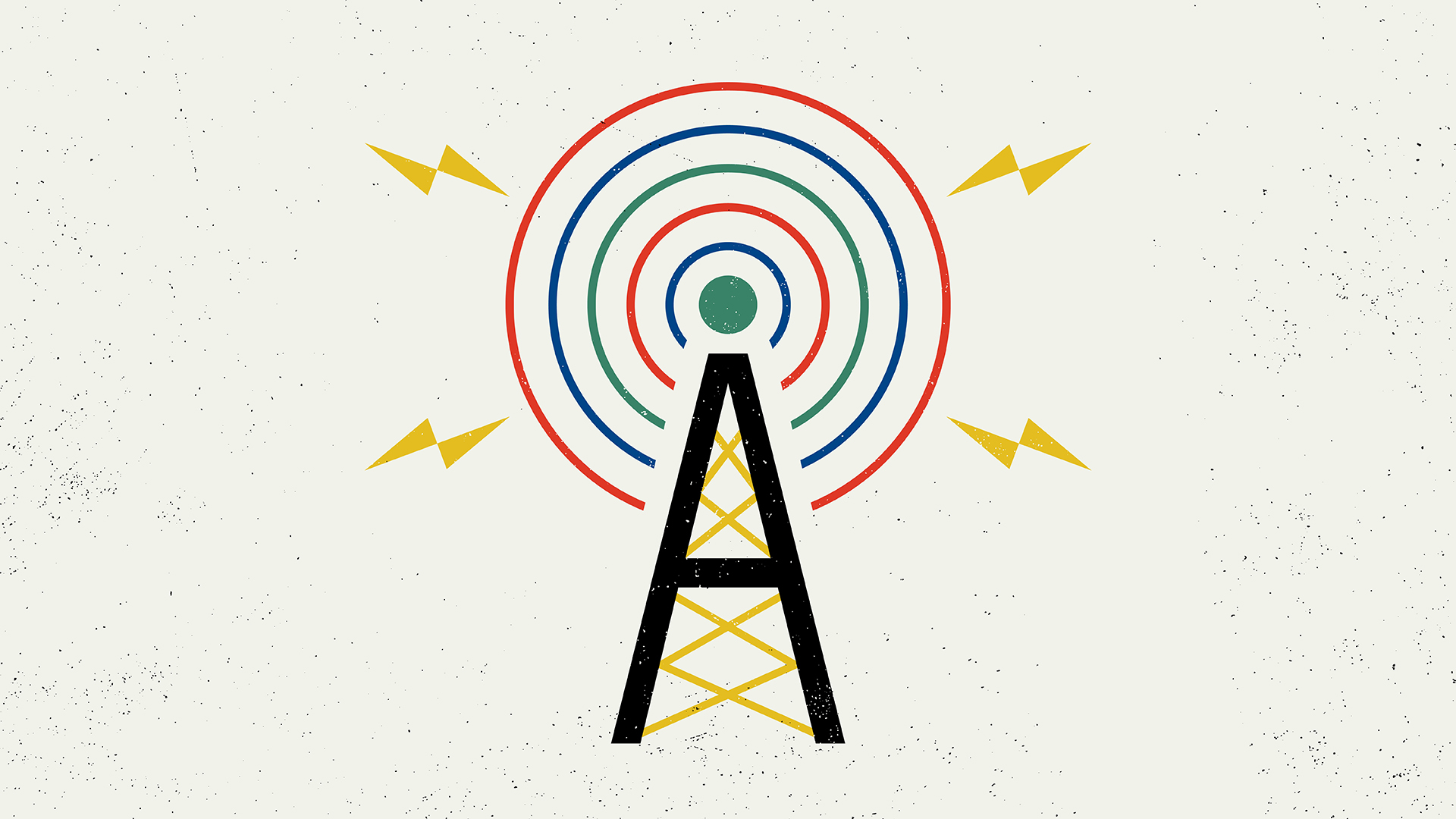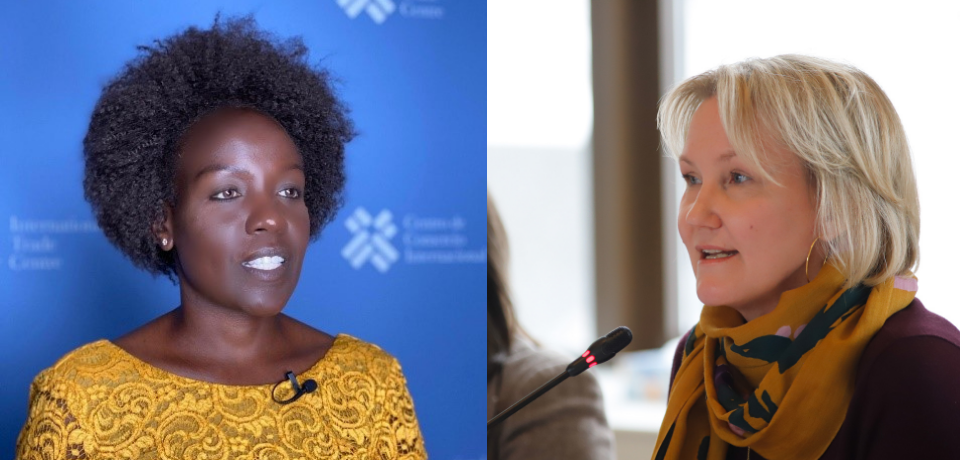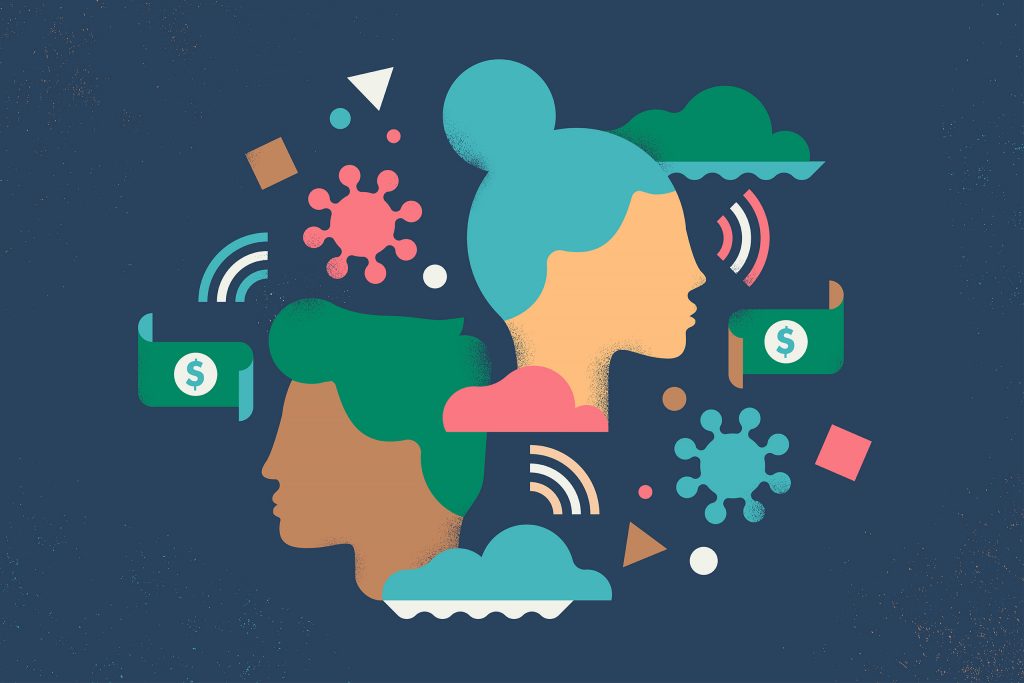Author: Interview with Nanjala Nyabola
BiographyInterview with Nanjala Nyabola
Nanjala Nyabola is a writer and political analyst based in Nairobi, Kenya. She is the author of Digital Democracy, Analogue Politics: How the Internet Era is Transforming Politics in Kenya and Travelling While Black: Essays Inspired by a Life of Travel.

Illustration by Brandon Serbec
In this interview, Nanjala discusses how the pandemic and trans-national movements like Black Lives Matter are already moving the dial on the future of journalism, social media, policing and democracy.
Nanjala Nyabola was interviewed by Calina Ellwand, Manager of Communications and Public Affairs at the Global Centre for Pluralism on July 20, 2020.
The following is a transcript of the interview, which has been edited for brevity and clarity.
Calina: You have written about the need for more thorough and balanced reporting of the pandemic across Africa, which highlights the creativity and agency of Africans rather than reinforcing “inbuilt tropes.” Does the pandemic offer an opportunity to reflect more critically on past reporting and inspire change?
Nanjala: For the past 50 or 60 years, the media model has been for foreign correspondents to extract stories from Africa and report them in their mother countries. This Heart of Darkness model moves copy in rich countries because it’s a very easy trope for audiences to use to try to make sense of things without having to think too critically about them. But it has never been representative of people and communities in the developing world. It’s always been extractive and exploitative. It’s always been a partial account, which has consequences long after that journalist has gone.
The foreign correspondent model is no longer seen as the best way to go about telling stories. Instead, we’re seeing more demands for equal participation of journalists from the places where these stories are being told. One of the opportunities that the digital age has created in media and public discourse is that people in the developing world are now able to write and speak directly against narratives, and this is creating change. Everywhere in the world, the old models of doing media are being challenged, undermined and reorganized.
With the pandemic, we are seeing the crashing together of these two forces. At the start of the pandemic, people just reached for the tropes: Africa is going to fail, people are going to get sick. The popular trope is that contagion and the weird monkey disease comes from somewhere in the middle of Africa and then makes the world sick. Now, we have the opposite scenario: it was other people who brought the disease and made Africans sick. Journalists didn’t know how to process that; there is no trope that allows you to flip that narrative very easily. Very few media houses ran that story and said, actually, it was the British, Americans and Europeans who came to Africa and brought COVID-19 with them.
The question now is are those media houses going to rise to the occasion and allow African journalists to tell holistic stories? Or will they just fall back on the old tropes? The more we make room for complete stories, the more we make room for people to see themselves as active agents in history rather than just passive participants.
Calina: People are being very active online, sharing various views and ideas about this virus, but we’re also seeing that conversation becoming very divided. How do you think that online space could be made more inclusive? Is there a role for big tech companies and government in regulating that process?
Nanjala: Big tech companies have abdicated their responsibility for moderating the conversations on their platforms for a long time. Part of the problem is this ambiguity about digital platforms. We use them as if they are extensions of the public sphere when, in fact, they are privately held corporate spaces that are being run for profit.
When the Chinese ambassador insults the US foreign minister on Twitter, for example, that has real geopolitical consequences. If Twitter was a publicly held utility, we taxpayers would be able to say, hey, we pay you to keep this space civil, honest and true, and you are failing in that role and you have to go and fix that. But these are private companies, so we are subject to however they evaluate the problem. The challenge is that, in their calculation, it’s always been a balance between profit and the public good. For the longest time, profit has outweighed the public good. Now, the fibre is so severely damaged that it has become difficult to regulate what’s happening online.
For example, in Ethiopia, because of the state control over the media, a lot of independent and ethnic media is administered through Facebook and WhatsApp. Broadcasts through these popular channels are not regulated. Last October a broadcast went out through Facebook. Something inflammatory was said, and 68 people died over a three-day period because of the subsequent clashes. Where does accountability lie? Facebook claims to do content moderation and stand between hate speech and misinformation and their audiences, but that’s just not true. Facebook did not have content moderation in any Ethiopian language until January of this year. When they did get that content moderation, it was in only one of Ethiopia’s 70-some languages.
Private corporations should take more responsibility. You shouldn’t be able to profit off hate speech and political misinformation. But this is neoliberalism, this is capitalism, and making money has become such an imperative that it dilutes all other calculations, even at the cost of our own survival.
With these digital platforms, no one is willing to ask the really awkward question, which is: Should people be making money off of dividing our societies deeper and keeping us misinformed? Whose responsibility is it to stop that? Facebook is not even 20 years old. We still have the opportunity to shape it, but we have to ask those hard questions.
Calina: Are citizens taking the lead in fostering understanding online since corporate and government powers are not doing it?
Nanjala: If it wasn’t for citizens spontaneously organizing and networking to try and clean up the mess, the cesspool would be much worse than it is right now. I am talking mostly about online groups that don’t have power offline. For example, it was black women, who are not represented in offline electoral politics in the United States, who started #yourslipisshowing to raise the red flag on Russian bots influencing US politics on Twitter. Or, in Kenya, LGBTQ communities, who wouldn’t have any space elsewhere, are raising the red flag on misogyny and online misinformation.
This is the weird paradox of tech. The good part is that we create space for groups that are not traditionally represented in the public sphere to coalesce around issues, events and causes. But it also makes possible all of this misinformation and inequality. The trick is going to be figuring out how to preserve the good and mobilize against the bad. And if it wasn’t for the good—for feminists in different parts of the world, or gamers, or groups like Access Now, or K-pop guys drowning out hate speech hashtags with K-pop videos—everything would be worse.
Calina: Right now, we are seeing a lot of solidarity in pushing back against racially motivated police brutality around the world. Is this a one-off? Or is this something that could turn into permanent changes in our governing and security systems?
Nanjala: We’ve already seen a palpable change. When you think about social change not just as an event but as a process, what the Black Lives Matter movement has done, particularly through social media, is shifted the discourse on police brutality in really tangible ways. Ten or fifteen years ago, the conversation on police brutality was just focused on retraining, which basically means giving more money to the police. Now, through online conversations, combined with offline mobilization and transnational discourses, Black Lives Matter has mainstreamed radical discourse on rethinking policing around the world. Even if this was it for the movement, that would still be a tremendous victory. But I don’t think it’s going to stop there. I think one thing the movement has done really well is connect online mobilization to offline action, like pushing legislation and endorsing candidates running for office. This is what translates into much more lasting change.
Calina: What do you think we have learned from the pandemic and what do you hope societies will hold on to moving forward?
Nanjala: We have been reminded of the importance of government. I think we had gotten to the point where the conversation around political science was so abstract that people took living in a society for granted. Now, it’s time to ask: Why do you live in a society? Is it so that your government can spend 40% of your national budget on the military and only 10% on public health, so when you’re confronted by a pandemic, death is almost sure? Or is it so that you can actually make demands on that government to protect you so that you are safer within that society than you would be without it?
For so long, and especially in Africa as a consequence of the structural adjustment programs, governments have starved our key social services, like public health and education, but there has always been money for the military. In Kenya, for example, even before the surge hit, all of our ICUs were full. We have 518 ICU beds for a country of 47 million people, but we recently gave the US government $14M for fighter jets.
The countries with the most robust socialized healthcare are going to come out of this the strongest. Hopefully this crisis will have us saying, maybe we don’t need 14 fighter jets; maybe what we need is hospitals that people can rely on and that we can all collectively support to make effective. The National Health Service in the UK is a consequence of the Second World War. Maybe this pandemic will remind us of the importance of socialized public health. I hope it will be a reminder for people that you cannot forget the fundamentals of government.




